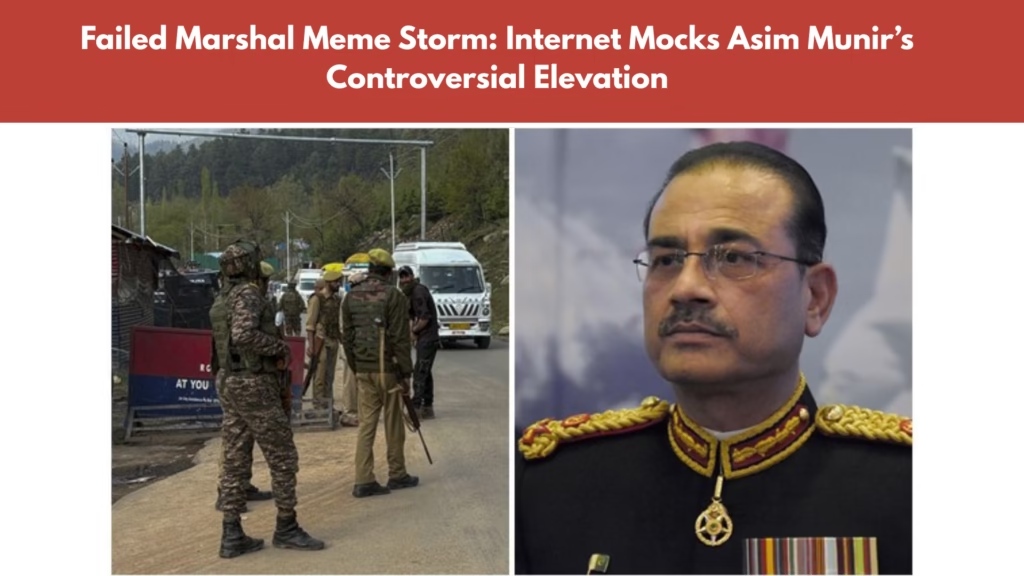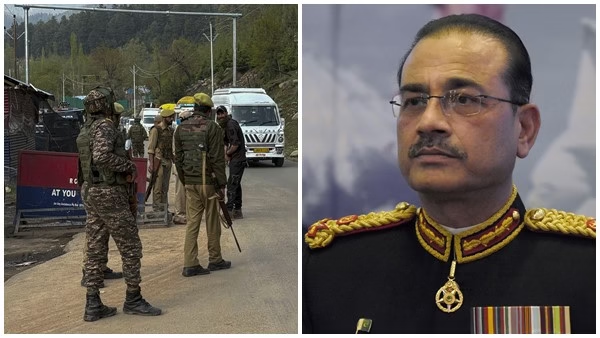Field marshal : Social Media Roasts Pakistan Army Chief’s Promotion After Military Losses

Field marshal
Introduction
Field marshal : In a move that has sparked both national and international debate, Pakistan’s Army Chief, General Asim Munir, was promoted to the prestigious rank of Field Marshal shortly after the country’s military setbacks during Operation Sindoor against India. This promotion, only the second of its kind in Pakistan’s history, has been met with widespread criticism and satire, particularly on social media platforms, where Munir has been mockingly dubbed the “Failed Marshal and a Field marshal.”
Background: Operation Sindoor and Military Setbacks
Operation Sindoor marked a significant military confrontation between Pakistan and India, initiated after a terrorist attack in Pahalgam, Jammu and Kashmir, which India attributed to Pakistan-based militants. In response, India launched precision strikes targeting terrorist camps in Pakistan and Pakistan-occupied Kashmir, reportedly destroying nine major camps and associated infrastructure. These developments led to a ceasefire brokered by the United States. Despite these events, Pakistan’s military, under Munir’s leadership, faced criticism for its handling of the situation, with reports indicating that Pakistani airbases were bombed during the conflict

The Promotion: A Controversial Decision
On May 21, 2025, Pakistan’s Cabinet, led by Prime Minister Shehbaz Sharif, approved the promotion of General Asim Munir to Field Marshal. This decision was justified by the government as recognition of Munir’s strategic leadership during the recent conflict. However, the timing and context of the promotion have raised eyebrows, given the military’s perceived underperformance during Operation Sindoor.
Social Media Backlash: The Rise of the “Field marshal” Moniker
The announcement of Munir’s promotion was met with a torrent of ridicule on social media platforms, particularly X (formerly Twitter). Users questioned the rationale behind elevating a military leader following a series of setbacks. The term “Field-marshal and a field marshal” quickly gained traction, with many accusing Munir of self-promotion and highlighting the incongruity of the decision.
Notable figures joined the fray; Indian singer Adnan Sami shared a satirical video titled “Will protect all donkeys,” further fueling the online mockery.
Political Implications: Concerns Over Military Dominance
Beyond the social media satire, Munir’s promotion has reignited concerns about the military’s influence over Pakistan’s political landscape. Analysts draw parallels between Munir and former military ruler Ayub Khan, the only other individual to hold the Field Marshal title in Pakistan. Critics argue that such promotions, especially in the wake of military defeats, signal a consolidation of power by the military establishment, potentially undermining democratic institutions.
Public Opinion: A Divided Nation
Public sentiment in Pakistan appears divided. While some view the promotion as a necessary step to bolster national security and morale, others see it as a political maneuver to shield military leadership from accountability. A Gallup Pakistan survey indicated a 93% boost in public opinion toward the military following the conflict, suggesting a complex and multifaceted public perspective.
Here’s a detailed informational table based on the blog “field marshal : Social Media Roasts Pakistan Army Chief’s Promotion After Military Losses” to help readers quickly grasp the core facts and controversies:
📊 General Asim Munir’s Promotion to Field Marshal – Key Facts and Reactions
| Category | Details |
|---|---|
| Name | General Asim Munir |
| New Rank | Field Marshal (Promoted on May 21, 2025) |
| Previous Rank | Chief of Army Staff (COAS) |
| Operation Involved | Operation Sindoor (India-Pakistan conflict) |
| Reason for Operation | Retaliation by India after Pahalgam terror attack allegedly linked to Pakistan-based group |
| Key Losses Faced by Pakistan | <ul><li>Loss of 9 terror camps</li><li>Airbases targeted</li><li>Casualties on the LoC</li></ul> |
| Promotion Approved By | Pakistan Cabinet, led by PM Shehbaz Sharif |
| Historical Precedent | Only the second Field Marshal in Pakistan after Ayub Khan |
| Social Media Term | “Failed Marshal And a field marshal” |
| Major Criticism | <ul><li>Promotion after military failure</li><li>Seen as political shielding</li></ul> |
| Popular Troll Example | Adnan Sami’s video: “Will protect all donkeys” |
| Public Opinion Survey | 93% public confidence in Army post-conflict (Gallup Pakistan) |
| Concerns Raised By Analysts | <ul><li>Militarization of politics</li><li>Dictatorial precedent like Ayub Khan</li></ul> |
| Impact on Democracy | Fears of military dominance and weakening of civilian institutions |
| International Media Coverage | Widely reported by NDTV, Economic Times, Reuters, and others |
| Notable Hashtags on X (Twitter) | #FailedMarshal #AsimMunir #PakistanArmy #MilitaryPolitics #FieldMarshalMunir |
| Satirical Reactions | Memes, parodies, historical comparisons, and mocking titles across platforms |
| Supporters’ Argument | Recognition of military strategy and leadership during difficult times |
| Critics’ Argument | Unjustified reward despite setbacks; shows lack of accountability |

Conclusion
General Asim Munir’s elevation to field marshal amidst military setbacks has become a focal point of national discourse, highlighting the intricate interplay between military actions, political decisions, and public perception in Pakistan. The widespread social media backlash underscores the growing influence of digital platforms in shaping narratives and holding leaders accountable. As Pakistan navigates its political and military future, the implications of such decisions will undoubtedly continue to resonate both domestically and internationally.




